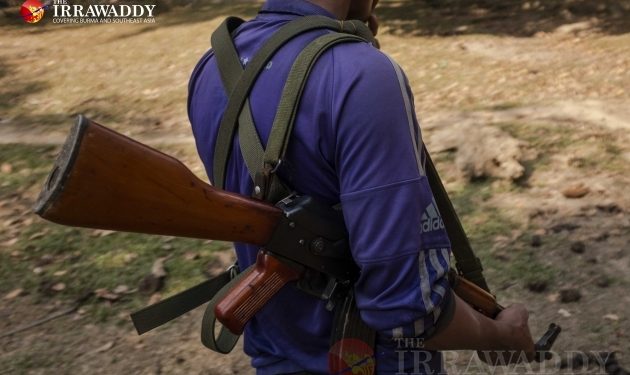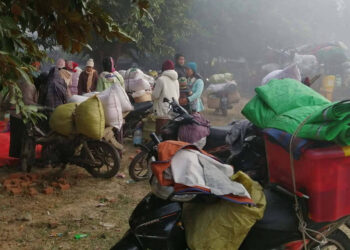Myanmar’s military regime has started arresting villagers in Rakhine State’s Maungdaw Township, after it suffered casualties in a clash with Rakhine ethnic armed organization (EAO) the Arakan Army (AA) in Maungdaw earlier this week.
The Myanmar military suffered heavy casualties, while 14 border guard police were captured in fighting with the AA on Monday in Maungdaw.
On Wednesday in a pre-dawn raid, the regime arrested three villagers from Kyein Chaung Village, including the village administrator, which is five miles from where Monday’s clash took place, said relatives of the detainees.
“As soon as they entered our house they seized all our phones and searched inside and outside the house. We don’t know what they searched for. We also don’t know why the three were taken,” a relative told The Irrawaddy.
Tensions are escalating in Maungdaw as the regime sends large number of troops into the township. Intra-city buses have also suspended operations, said residents.
AA spokesman Khaing Thukha told Rakhine-based media that the attack on junta troops on Monday was retaliation for a junta air raid on an AA outpost in Karen State near the border with Thailand in which six AA fighters were killed.
Tensions in Rakhine State have reached a point where negotiations are impossible between the Myanmar military and the AA, a source close to leaders of both sides told The Irrawaddy.
“It appears that it is no longer possible for the two sides to negotiate. A return to war is likely. Military tensions are so high on the ground that the military sending General Yar Pyae and the AA negotiating through intermediaries is not enough to solve the problems,” he told The Irrawaddy.
Lieutenant General Yar Pyae heads the National Solidarity and Peace Negotiation Committee, which was formed by the regime to hold peace talks with EAOs under the framework of the Nationwide Ceasefire Agreement.
In April, junta chief Senior General Min Aung Hlaing called for face-to-face peace talks with EAO leaders. Major ethnic armed groups including the AA refused to hold talks with the junta boss, but AA leader Tun Myat Naing did hold talks with the parallel National Unity Government. The AA has publicly admitted to training and arming some resistance groups fighting the regime.
A military and political affairs analyst said that despite rising military tensions in Rakhine, the possibility of large-scale conflict there depends mainly on the AA, given the current political and military landscape in the country.
“Where there will be renewed fighting in Rakhine depends on the AA. The military is now too understaffed to conduct a large-scale assault similar to previous years. It has only prepared for defense. The military’s current operations are limited to controlling towns and major transportation routes. If the AA attacks towns and transportation routes, there will be heavy fighting. If that happens, not only villages but towns will go up in flames,” said the analyst.
Since November 2020 the Myanmar military and the AA have observed an informal ceasefire, after two years of intense fighting. However, sporadic clashes between the two sides have been reported since May in Paletwa Township in Chin State, which neighbors Rakhine.

















